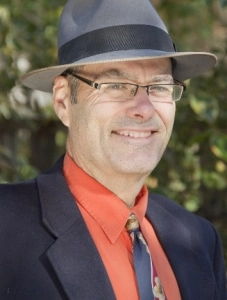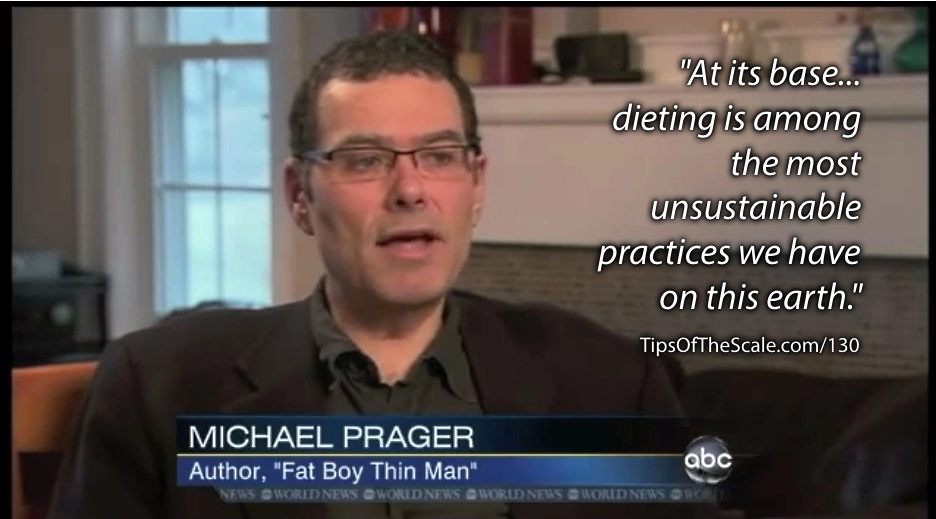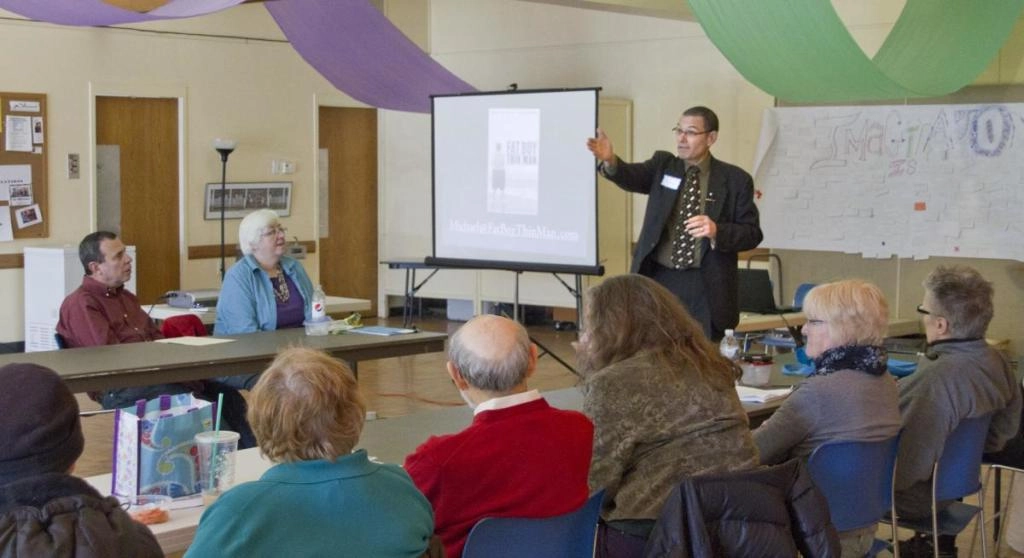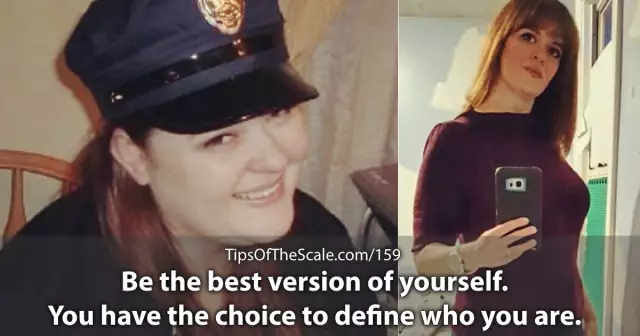Journalist, author, speaker and weight-loss success Michael Prager discusses “personal sustainability” as a key to weight loss and more in life. What can you do that will solve a problem so that it won’t come back?
“I think sustainability is… one of the keys to life.”
Weight Gain Background and Contributing Factors
As to why he was heavy, Michael says that’s a complicated question. Michael shares that food was a source of comfort for him at an early age, and he could tell from a young age that food was more important to him than it was to his siblings.
Michael identifies as a food addict, and biochemically he found that he reacted differently to food than many other people did.
“I’m crazy around food.”
Addictions in family can cross from what substance one is addicted to, from food to alcohol, for example. Michael says he was hyper-focused on food—he would sneak food, eat alone, take money from his parents to buy food, and take out the family car to drive to get donuts in the middle of the night.
How Being Overweight Impacted Michael’s Life
Michael weighed 332.5 pounds (151.1 kg) as a junior in high school, and saw Dr. Atkins (yes, that Dr. Atkins) for treatment. He lost 130 pounds (59.1 kg) on the Atkins diet the first time he tried it, but gained the weight back immediately. Michael lost that same amount of weight again a few years later, and again regained it, climbing back up to 365 pounds. (165.9 kg)
Michael says he was a “great weight loser,” but that isn’t the important thing, that is one important thing. More importantly, he needed to find sustainable changes for long term success. Michael says that he was clearly not enjoying the life that he was living. Michael shares that he didn’t have a steady girlfriend until he was 36, a fact that really troubled him.
“I wanted to world to love me, but I wasn’t feeling very loving to the world. When I am more loving I am more likely to succeed in the world.”
The Turning Point
There wasn’t just one wake up call for Michael, but rather a series of moments of getting better, of recovery. Michael discusses how he was in counseling with Dr. Robert Deutch before he went to rehab. In counseling he discovered that when he was emotionally hurt, Michael would take on an affect of “sad sack-ishness,” saying ‘I’m so in need of help,’ etc.
In rehab Michael learned that his affect and body language was radiating bad vibes and hostility instead of asking for help. It was a profound discovery to realize that what he was putting out into the world was accomplishing the exact opposite of his goals.
The cause of Michael going to rehab was a group of concerned co-workers. They approached Michael’s boss and got him to contact Michael about seeking out some therapy. Michael recalls thinking there was no evidence to support that he could get himself out of his problem, despite the fact that he was (and saw himself as) a fact-based person.
Michael entered rehab at an eating disorder clinic on Long Island, NY in 1991 in his early thirties. His primary goal on entering rehab was understanding that he was a person with an eating disorder, not asking why he was that person. Michael says that he (a bit reluctantly) got into the habit of taking simple suggestions for people in rehab.
“Really, what I had was enough pain that I was occasionally willing to listen to part of what some people might have to say. And they accumulated over time.”
Michael describes himself as a “recovering know-it-all,” and says he used to ask himself:
“If I’m so smart, how did I end up in rehab?”
Michael says he felt like he had to listen to what the therapist or counselor had to say because he saw that sometimes you reach a point where you just have to take someone else’s advice and suggestions to gain health.
All told, Michael spent 9 weeks in rehab, and he learned techniques to spend mental energy on fruitful things like facing a problem by thinking ‘how can I react to this situation’ versus ‘why did this happen to me?’
Elements of Recovery
Michael shares that a large part of his recovery was to focus on the long game.
“At it’s base…dieting is among the most unsustainable practices we have on this earth.”
‘How am I most likely to achieve sustainability?’ Is the question we need to ask ourselves. You cannot apply a short-term solution to a long-term problem.
When you are facing a day-to-day choice, it is helpful to think long term. There are so many implications that spin out from the decision to get one meal at McDonalds, but what we put in our bodies at each meal really matters.
Michael argues that selfishness is not a bad thing when it comes to prioritizing one’s own personal health. It’s good to aim for health, because a healthy body and mental state has a ripple effect out to your own family, friends and community.
Challenges Michael Faced Along The Way
One of Michael’s fiercest obstacles was taming down his ‘know it all’ personality, so that he could hear and try a good suggestion when one was presented to him.
He had to become more willing to change. This was a long process! Looking back, Michael sees that making small changes was the only way this growth process would have worked for him. He says that if he was presented with the totality of what changes he would have to make in his lifestyle and personality, the task would have seemed impossible.
“I needed not to focus on my weight.”
Instead Michael finds it important to focus on the mental aspects of overeating. One’s weight can often be a symptom of mental processes. For Michael, taking the focus off weight loss and focusing on mental changes resulted in the loss of 155 pounds and keeping that weight off for almost 20 years.
Current Mindset, Nutrition, and Exercise
Michael uses the analogy of a hamster on a wheel as how his brain acts to justify his (self-described insane) actions when he wants to eat a certain food and “get his fix.”
Michael shares that once he told himself he could only eat popcorn when he was at a movie, since that is a time most people eat popcorn. Michael found himself at a theatre and even though there was no movie he wanted to see, he went in anyway and saw one, just so he could eat the popcorn. He currently doesn’t eat popcorn, as this experience showed him he has no control over his brain’s ‘hamster-wheeling’ around that food.
Michael works closely with the nutritionist Theresa Wright (contact info below under resources) who he respects and trusts completely. He has worked with her for many years and his eating plan has evolved over time. While he has found what works for his body, Michael emphasizes:
“It’s not the only way to do it!”
Michael eats 6 times each day now. Currently Michael does not eat refined sugar or flour. While he admits that he thinks food like that still tastes good, he now has the perspective that he had plenty of years in the past to eat them.
“I like my life better without those things; even if they still taste good to me.”
He also has eliminated popcorn, dried fruit, and cut back on nuts. He focuses his food choices on whole foods, and tries to minimize processed foods when he can. He tries his best not to spend energy on wanting food and hand wringing around food, instead it is easier for him just to cut out certain foods.
Michael explains that he doesn’t do exercise for maintenance, but rather for mood, longevity, muscle tone, and better sleep. While Michael thinks there is “enormous payoff for exercise,” it cannot address or negate overeating. Over the past 5-8 years, Michael says he goes out of his way to document his exercise with RunKeeper or other apps, and seeing the data keeps him motivated.
Michael’s Advice For Your Journey
Michael says when you have the impetus to make a change, seize it!
“Don’t try to do it alone.”
“Take action. Don’t make the decision to take action. Take action, it’s different.”
Resources Discussed In This Podcast
- MichaelPrager.com
- Fat Boy, Thin Man, Michael’s book (chapters are available to download for free) [ Amazon ]
- SaneFood.com – (Theresa Wright at Renaissance Nutrition Center, outside of Philadelphia)
On Michael’s Workout Playlist
- Won’t Get Fooled Again by the Who [ Amazon / iTunes ]
- Sonny Landreth [ Amazon / iTunes ]
- Los Lobos [ Amazon / iTunes ]
- Radiohead [ Amazon / iTunes ]
- U2 [ Amazon / iTunes ]
Contacting Michael
- Website: FatBoyThinMan.com
- Personal Site: MichaelPrager.com







You must be logged in to view comments.